Symrise has developed a system for sustainable raw material procurement that ensures the supply of materials and their terrific quality. It also enables farmers to manufacture their products in a way that is both environmentally conscious and socially responsible over the long term. To realize these objectives, Symrise relies on good agricultural practice, social and educational projects, collaboration with local scientists and long-term partnerships with nongovernmental organizations dedicated to protecting nature and the environment.
The company applies these principles at more and more locations around the world. Take, for instance, the sustainable and completely integrated vanilla supply chain: For this purpose, Symrise has been working with some 7,000 small-scale farmers in Madagascar for years. Similarly, Symrise sources raw materials for sustainably produced cosmetics ingredients from the Amazon region. In October 2017, the Group launched a three-year project in this region with the Brazilian cosmetics manufacturer Natura and the German Society for International Cooperation (GIZ). The partners work together to protect biodiversity in the rainforest; along with scientific partners from the region, Symrise also identifies new raw materials for scent and care products. More diversity also ensures greater economic security: Around 1,000 farmers should be able to boost their sales by 20 %. With this support, their products should then be able to apply for the Union for Ethical Biotrade’s (UEBT) renowned UTZ certification.
Based in Amsterdam, the nongovernmental organization is also an important partner when it comes to purchasing bergamot in Calabria, southern Italy, where Symrise sources the citrus essential oils from the long-standing company Capua 1880. Working with agricultural experts from Mediterranea University of Reggio Calabria and with the support of Symrise, a UEBT team has examined the value chain in the region, surveying around 350 farmers. “We discovered that the risks associated with bergamot cultivation are not that significant – however, there are many forward-looking opportunities when it comes to protecting the environment, biodiversity and social conditions for farmers. But we need to take certain factors into account – for example, the changes in rainfall patterns due to climate change,” explains Rik Kutsch Lojenga, Executive Director of UEBT, who believes in collaborative learning. “Our project has brought about a new awareness of sustainability issues among all participants.”
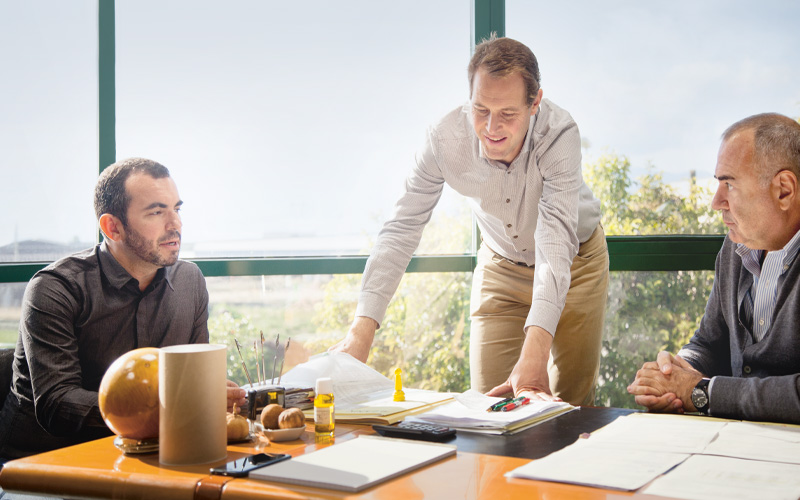
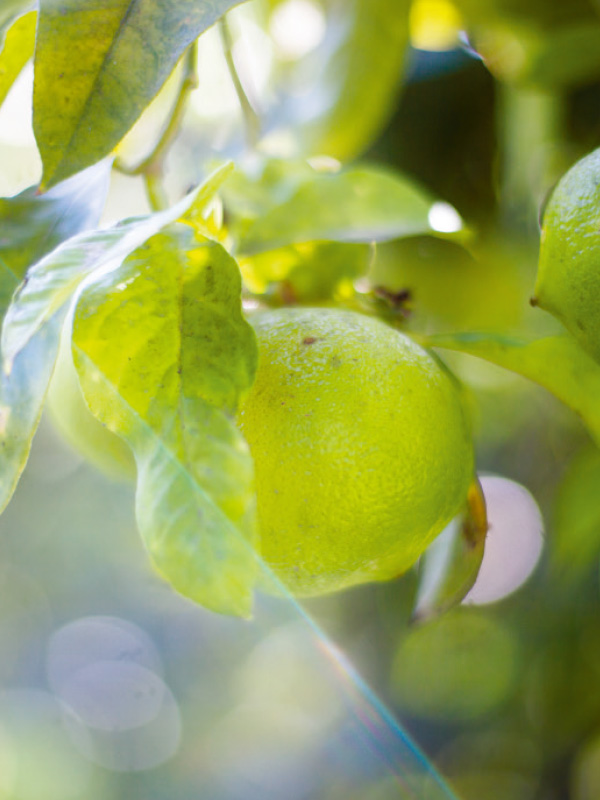
“Our project has brought about a new awareness of sustainability issues among all participants.”
Rik Kutsch Lojenga
Executive Director of UEBT
One example is field irrigation, which Capua 1880 initiated for farmers following the analysis. “The company has hired an agronomist who ensures that more sustainable cultivation methods and good agricultural practices are implemented and will install a monitoring system,” explains Rik Kutsch Lojenga. In the future, the plants could possibly even be irrigated underground. “This would allow farmers to use resources more efficiently, conserve water and protect trees from disease caused by mold and fungus.” Capua 1880 has also purchased 30 hectares of land to be used for experimenting with cultivation and fruit innovations. The cultivation of old bergamot varieties is also in the pipeline in order to retain the species’ genetic diversity, which will ensure higher resilience for future plants.
At the same time, the aim is to boost biodiversity in the Reggio Calabria region, which contains three microclimates. The close proximity to the Ionian and Tyrrhenian Seas supplies salty air and a variety of winds, while the different locations of the plantations – at the seaside, on flatlands and in the mountains – ensure variations in temperature. The result of this is a special climate that supports the fruit throughout its growth cycles. “We need to make sure that we maintain this diversity,” says Rik Kutsch Lojenga. This also includes reinforcing the typical landscape by cultivating certain trees, plants and herbs around the plantations that, for example, prevent erosion.
Social aspects were a further part of the analysis that Symrise initiated with the environmental organization. “Bergamot represents Calabria, where many small-scale farmers are responsible for cultivation. It provides a whole host of opportunities to earn a living in a region with a weak structure,” explains the UEBT director. Capua 1880 supports farmers by paying on a weekly basis, following harvest, and negotiating prices for a period of ten years with Unionberg, the largest cultivation cooperative. Farmers benefit from reliable, predictable incomes, says Rik Kutsch Lojenga. “As a result, structures that enable sustainable cultivation over the long term can grow or establish themselves.”
With its activities in Calabria, Symrise has made a key contribution to enabling the company to obtain citrus fruit from a sustainable source in the future. The classics – orange, lemon and lime – will follow. Bergamot from Calabria has long been a versatile complement to the product portfolio. For instance, its oil provides perfumes and shower gels with invigorating, fresh and long-lasting scents, Earl Grey teas with their special character and many other foods and beverages with their unique twist – and will one day also be used by Symrise perfumers and flavorists in countless fragrance and flavor compositions at production and development sites around the world.
Click on this link to view a video about the sustainable cultivation of bergamot in Calabria.




Farmers
Committed to organic cultivation
Capua 1880 works with around 480 suppliers in Calabria, some of whom have been cultivating bergamot on their fields for decades. Most of them belong to the Unionberg cooperative, while others, such as Luigi Framatino, supply the company directly. The citrus farmer, who also plants and harvests mandarins, grapefruits and lemons, has cultivated his six hectares with bergamot trees, in accordance with certified organic standards. The 74-year-old says that he wants to show Mother Nature the respect she deserves, so that she will supply healthy food in return.
Framatino is convinced that environmentally friendly methods are the best way to do just that. He participated in the first survey of the joint project of Symrise and the Union for Ethical BioTrade, which examined the bergamot value chain. The result for him: Like many other farmers, he wants to switch to underground irrigation, for example, to conserve resources and to make his operations even more eco-friendly.
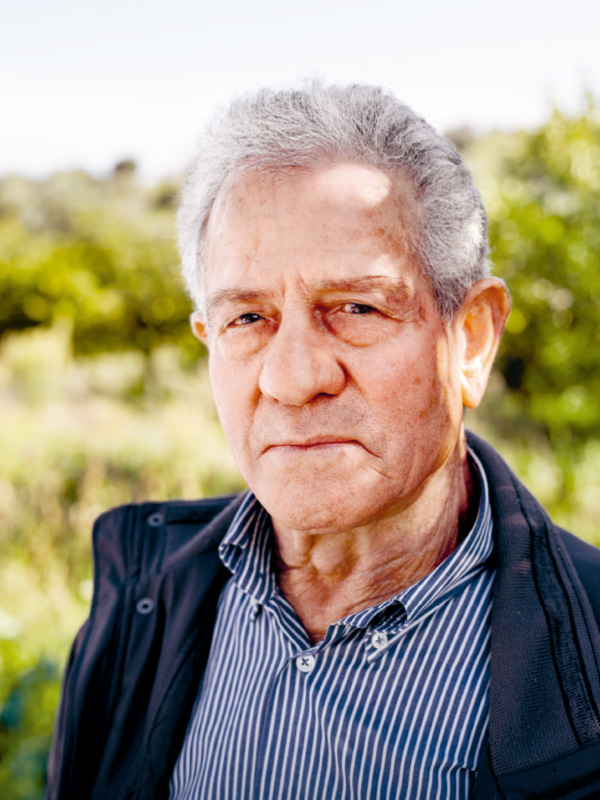
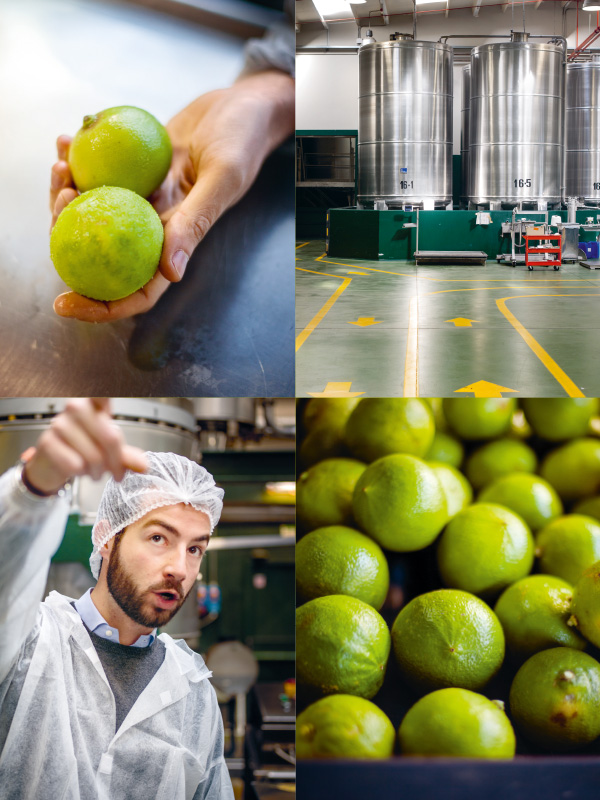
Production
Cutting-edge equipment
The Capua 1880 factory is located in an industrial area in Campo Calabro. The company invested a lot of money to develop a production facility that meets the latest standards. It is divided into fragrance and flavor areas. In addition to bergamot, the company’s 70 employees also process other fruits such as oranges, lemons and mandarins. The essential oils can be stored in shiny silver tanks for up to twelve months. And that is not easy – citrus oils in particular are prone to oxidation and therefore need to be stored under a “lid” of nitrogen. Through a system of pipes, the oils flow out of the storage containers and into evaporators, separators and distillation columns for processing. Finally, employees combine the oils to create finished mixtures. Depending on ripeness and harvest time, the products have different fragrance profiles, which the company standardizes in accordance with customer specifications. As an important buyer, Symrise has very clear ideas about bergamot oils – after all, the company wants to use them in very special fragrance and aroma compositions around the world.
Family
Bergamot in their DNA
Capua 1880, which has been supplying Symrise for years, is the perfect example of a family business. Gianfranco Capua has been managing the company for 40 years, now accompanied by his twin sons, Giandomenico and Rocco; they represent the fifth generation to successfully lead the company, established in 1880, into the future. Based in Campo Calabro, Capua 1880 has been producing bergamot and other citrus oils since the very beginning. Back then, employees extracted the valuable oil using sponges, which were pressed against the peels and then wrung out. What was once an entirely manual process is now a high-tech production chain.
The family invested heavily in the modern production facilities at which the oil is refined, mixed and decanted into containers. At this site, the company produces around 60 % of the world’s demand for bergamot essential oil and has increased its sales from € 9 million to € 50 million over the past 20 years. Its high-tech production ensures superior quality that Symrise has come to rely on. Despite all the technological finesse, the family business and passion for bergamot are still the top priority for the family. The three Capuas know every detail when it comes to their raw materials, the necessary climate, working the fields, production and markets around the world.
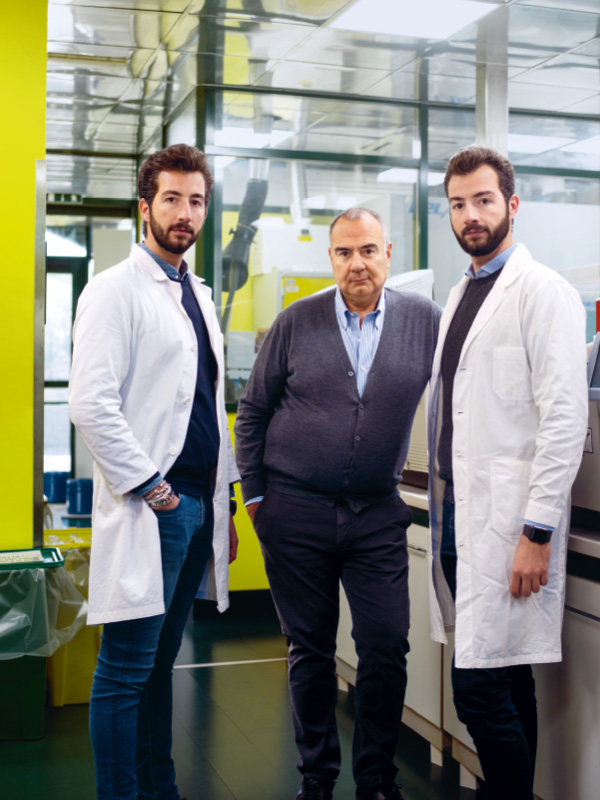
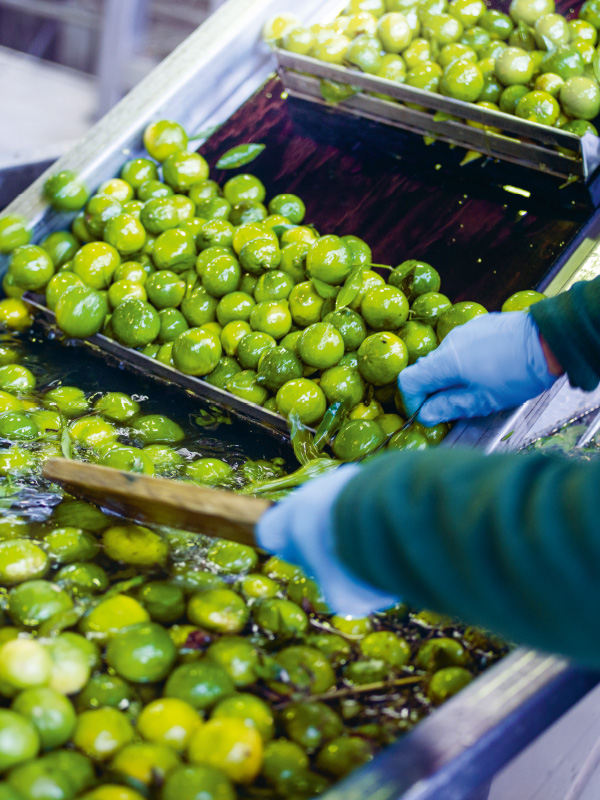
Processing
Cold-pressed premium oils
In San Gregorio, not far from Reggio Calabria, Capua 1880 manages one of the largest citrus extraction operations in Europe. The company purchased the production facility, which was built in 1934, nine years ago. The bright, sun-drenched hall contains green transportation boxes filled with thousands of bergamots. One after the other, they are washed, sent up rattling conveyor belts and dropped into silver drums, where they are continuously spun while rubbing against sharp graters. Using centrifuges, employees extract the green or yellow oil – depending on the harvest and the time of year – from the grated peel, which ultimately flows through a filter and into a bucket: The aromatic raw material, which serves as a basis for a great deal of Symrise compositions, is now finished. The highly sustainable production process uses as much of the raw materials as possible. The juice generated through the process is sold, and the remaining peel is passed on and used as a fertilizer.
Bergamot Oil
A classic perfume ingredient
Just about everyone is familiar with the scent, without knowing exactly what it is: Clear, fresh and invigorating bergamot essential oil is used as a top note in many eau de colognes and eau de toilettes – in a third of all men’s and half of all women’s fragrances. Cosmetics manufacturers incorporate the product into soaps, deodorants, toothpastes and shower gels. The oil is also used to flavor tea varieties such as Earl Grey and Lady Grey. Bergamot is rarely used in foods, though there are jams and liqueurs made from the fruit, particularly in Calabria. In the field of alternative medicine, the juice is also believed to be a natural way of lowering cholesterol.
The raw material is derived from the fruit of the bergamot tree, which stands around four meters tall and is harvested between November and March. The round / pear-shaped fruit weighs between 100 and 200 grams and has a diameter ranging from 5 to 7 centimeters, though some can grow much larger. The fruit grows almost exclusively along an approximately 120-kilometer-long strip of coastline between the Ionian and Tyrrhenian Seas in Calabria, southern Italy. In fact, 90 % of global production comes from this region.
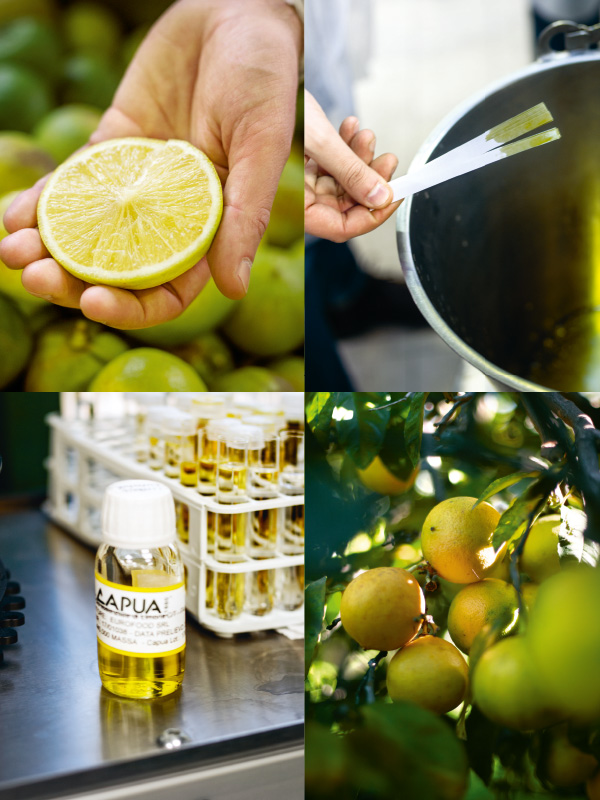
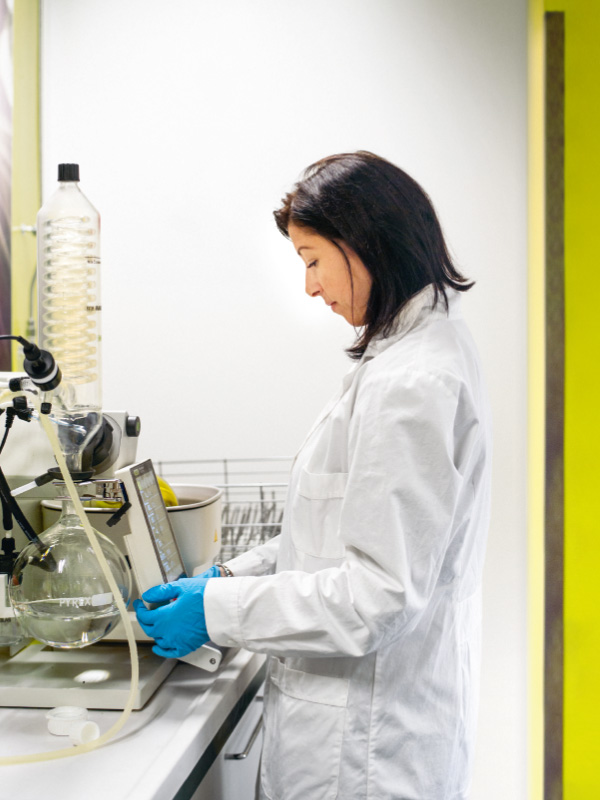
Quality
A wide range of tests
The Capua 1880 laboratory is jam-packed with testing equipment and small pilot factories. The team has a variety of tasks designed to ensure the excellent quality of the product. Using gas chromatographs, they assess the composition of the oil, which later provides the complex citrus notes in perfumes. Around 350 molecules in bergamot, such as linalool, bergapten, nerol, limonene, citropten and bergamottin are responsible for the fragrances. All of the raw materials and the finished products are thoroughly tested to determine their purity and toxicological characteristics, as well as to identify any potential residue, e.g. from pesticides or fungicides. In the pilot facilities, employees are experimenting with new compositions that better meet the customers’ needs. Capua 1880 also fulfills all the important ISO certifications, as well as organic, kosher and halal standards. And the final result is always an authentic, natural product.
